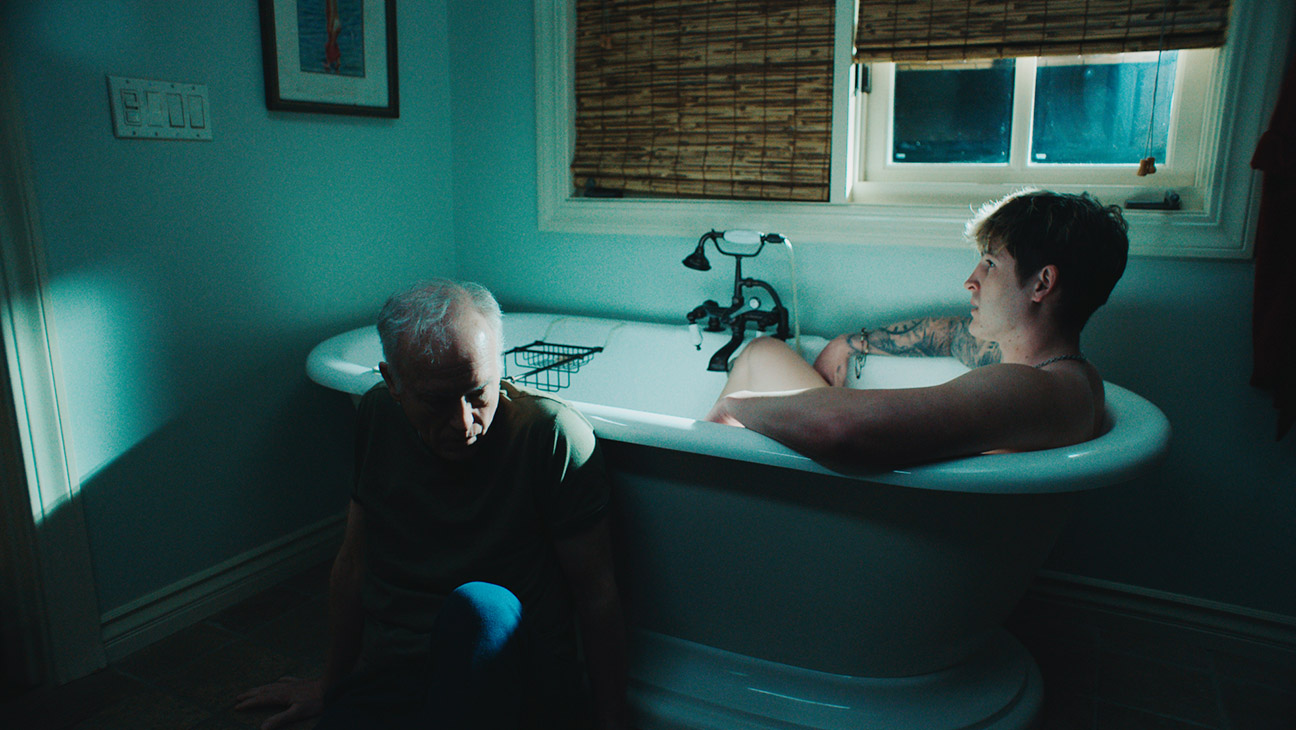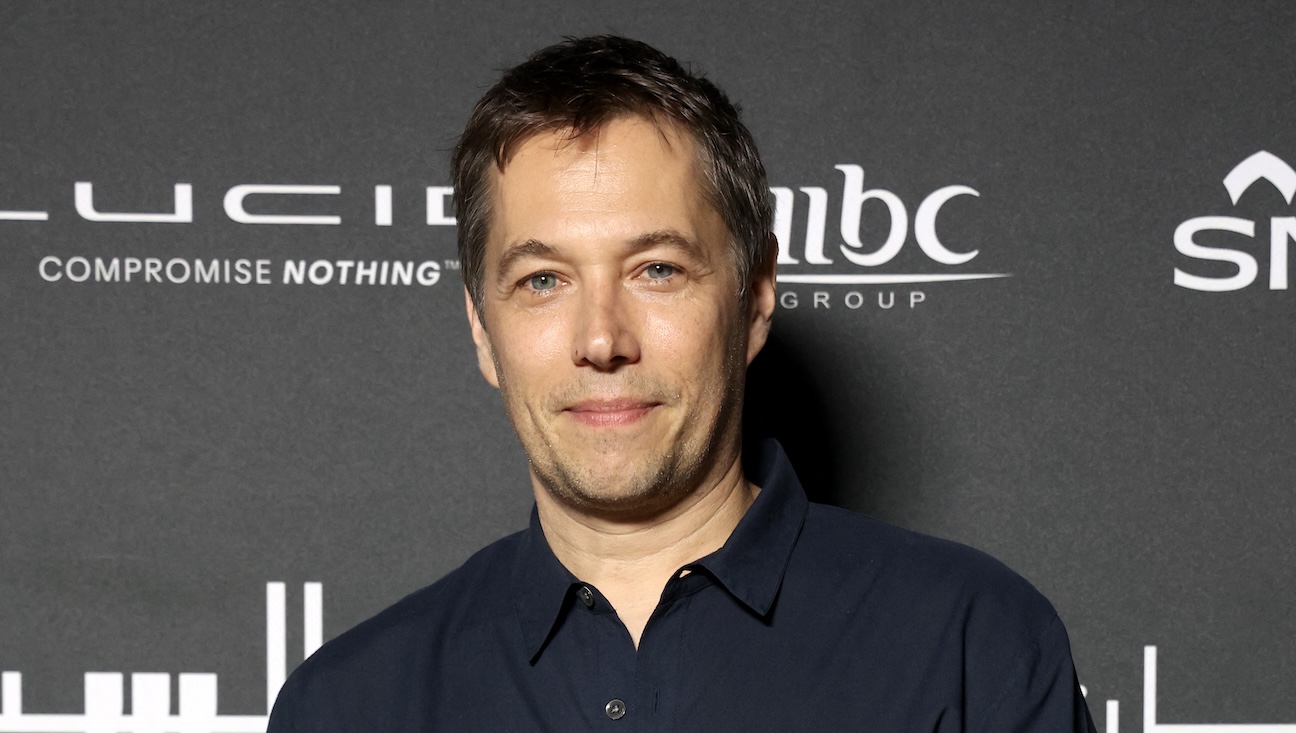Aaron (Kieron Moore) is lying in a hotel bed with Hank (Reed Birney) snuggled up with him. They’re practically spooning. Aaron is young and attractive, with a strong jaw and visible tattoos. Hank is a pale, white-haired man well into middle age. They’ve just had sex for the third time tonight, after two awkward first tries.
But it’s not the age difference that got between them, it’s the disturbing context of their pairing: Hank was Aaron’s English teacher years ago back in Maine. At 12, Aaron became the object of Hank’s affection. Hank is a pedophile and hasn’t seen Aaron since he was fired from school and arrested for going after a boy named James in the bathroom during lunch. Thankfully, as Hank sleepily confesses, James got away.
Blue Film
Burrows deep and draws blood.
In a sense, Aaron got away too, at least at first. Hank, known then as “Mr. Grant,” says he fell in love with Aaron and held on to that “love” through his pursuit of James, getting caught, his 7-year incarceration, release and return to society. But within that time, Aaron has changed in significant ways. After leaving Maine at 17, the shy boy Mr. Grant once knew changed his name, moved to Los Angeles and transformed into a verbally aggressive, dominant cam boy.
When he arrives at the hotel room, lured by the promise of sex and easy money, he meets a man in a black ski mask with a video camera set-up. Aaron plays along for a while, but eventually grows tired of all the probing questions. It isn’t until Hank says Aaron’s real name and removes his mask to reveal his own identity that the real dialogue truly begins. What follows is an emotionally charged conversation interrupted by brief interludes of messy, taboo sexual contact.
Elliot Tuttle’s sophomore feature Blue Film is not for the faint of heart. The film — which premiered last summer at the Edinburgh Film Festival, screened at several subsequent fests and is still, as of the writing of this review, looking for distribution — forces the audience to get to know a pedophile and watch him have sex with his former student and would-be victim. Those who have the stomach for it and can work past their reflexive revulsion will be treated to a daring queer film from a fearless and intelligent new voice of independent cinema.
Blue Film provokes and captivates in equal measure, with the naked honesty of a black box off-off-Broadway play. It’s a two-hander chamber piece that doesn’t pull any punches in its dialogue or presentation. The intimacy between Aaron and Hank is as believable as it is disquieting. This is a conversation between two men that very rarely takes place, onscreen or in real life.
At first, both men are hiding: Aaron metaphorically, behind his dominant persona; Hank behind a literal ski mask. Hank’s voice is gentle and polite, but that doesn’t put Aaron at ease. Even before Hank removes his mask, there’s fearful recognition in Aaron’s eyes. His persona is a performance but also a suit of armor. But behind it all, Hank believes that Aaron is still Alex, the troubled little boy who caught his attention all those years ago. Hank recalls their shared past as a love story, and his teaching a form of courtship. The classroom was a chance to impress Alex. Lunch was a time to watch him. With the excitement and delusion of Humbert Humbert imposing a purple-prose narrative on his pedophilic assumptions, Hank speaks of his former student like a James Dean figure — beautiful, brooding and quietly intelligent.
Many times throughout the film, Aaron inquires about the “love” Hank supposedly has for him. Each answer is unsatisfying, as Aaron struggles to recognize the soft boy from his former teacher’s memories. The first time Aaron and Hank try to have sex, Hank struggles to get aroused. Later, he makes a bold suggestion — they will both role play as their younger selves. To achieve this, Hank takes control in the dynamic and shaves Aaron’s entire body.
This is where Moore’s performance really shines, as he plays Aaron’s forced regression back into childhood. The more Hank gets what he wants from the interaction, the smaller Aaron becomes. And yet he doesn’t quite lose his power entirely. By giving Hank what he desires physically, Aaron is able to be bolder with his questioning, pressing Hank on the stories he tells himself about his sexual appetites. Character actor Birney gives a truly chilling performance as a pedophile who sees himself as a principled, spiritual romantic being tested by God to resist the sin that once destroyed his life.
Blue Film never lets us forget the perversion of its premise. Editor Zach Clark intercuts the intimate scenes between Aaron and Hank with home video footage of little boys smiling and playing. Their inclusion underlines the wider context of the film, provoking the audience to hold these pure and impure images together. Blue Film feels like an uneasy mashup of Gregg Araki’s empathetic drama Mysterious Skin with the bitter humor and angst of Michael Cuesta’s L.I.E. Tuttle has made a film that crawls directly under the skin, burrowing deep and drawing blood.





